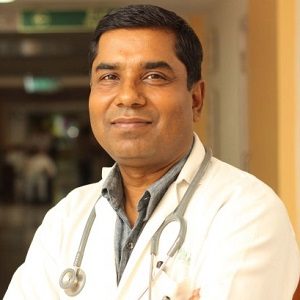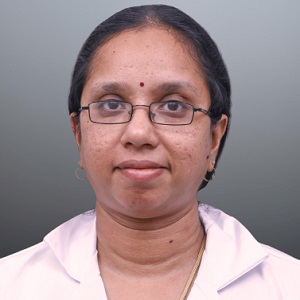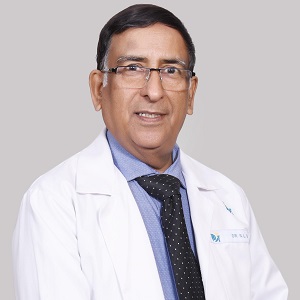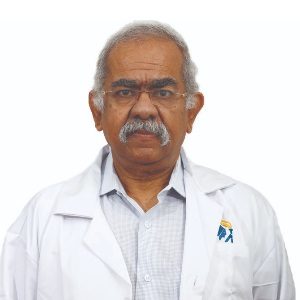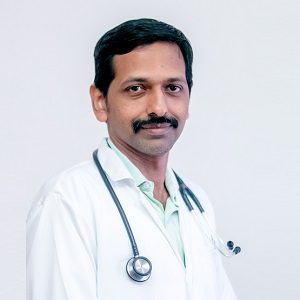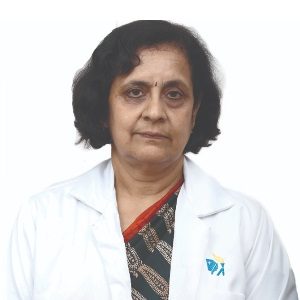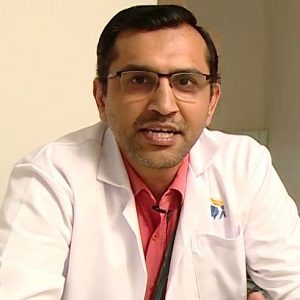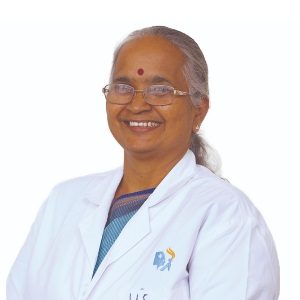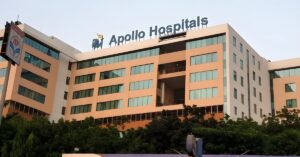Best Doctors in India for Capsule Endoscopy
- Top Gastroenterologist & Hepatologist | Apollo Hospital, New Delhi, India
- 30+ Years Experience
- Indraprastha Apollo Hospital, New Delhi
Profile Highlights:
- Dr. Amitabha Dutta is a highly esteemed Gastroenterology and GI Medicine Specialist with over 30 years of distinguished experience in his field.
- He practices at Apollo Hospitals Indraprastha in New Delhi, where he offers expert care in diagnosing and treating a wide range of gastrointestinal conditions.
- He further advanced his qualifications with prestigious fellowships, earning FRCP from The Royal College of Physicians of Ireland in 2014 and FRCP from the Royal College of Physicians, London in 2015
- Gastroenterologist, Chennai, India
- Over 13 years’ experience
- Apollo Clinic Valasaravakkam; Chennai
Profile Highlights:
- Dr. M Tarakeshwari is a well-known gastroenterologist who provides various services to her patients and is an expert in cytokines in IBS, treating Hepatitis B in pregnancy as well as renal failure in Cirrhosis.
- Some of the services provided by the Dr. M Tarakeshwari are: Acidity Treatment, Gallbladder (Biliary) Stone Treatment, Bladder Cancer Surgery, Inflammatory Bowel Disease (IBD) Treatment Ulcerative Colitis Treatment, etc
- Top Medical Gastroenterologist | Apollo Hospital, New Delhi, India
- 54+ Years Experience
- Indraprastha Apollo Hospital, New Delhi
Profile Highlights:
- Dr. Sohan Lal Broor is a Gastroenterologist and has an experience of 54 years in this field. Dr. Broor practices at Indraprastha Apollo Hospitals in New Delhi.
- He completed MBBS from Panjab University in 1967, MD – Medicine from PGIMER, Chandigarh in 1972, and DM – Gastroenterology from PGIMER, Chandigarh in 1974.
- Dr. Sohan Lal Broor is a member of the 2-Year Fellowship in Gastroenterology at Medical College Of Wisconsin, Milwaukee, USA.
- Some of the services provided by Dr. Broor are Irritable Bowel Syndrome ( IBS ) Treatment, Peptic/ Gastric Ulcer Treatment, Inflammatory Bowel Disease (IBD) Treatment, Hemorrhoids Treatment, and Gastritis Treatment.
- Gastroenterologist and GI Medicine Specialist, Chennai, India
- Over 23 years’ experience
- Apollo Hospitals Greams Road
Profile Highlights:
- Dr. Revathy Shanmugam is an experienced Gastroenterologist in Tamil Nadu, having an experience of 23 years in the management of GI disorders, Training & Teaching.
- She is highly skilled in the services like Liver Disease Treatment and Inflammatory Bowel Disease (IBD) Treatment.
- She has published various scholarly works in many National & International Publications of Medical Gastroenterology.
- Gastroenterologist and GI Medicine Specialist, Chennai, India
- Over 32 years’ experience
- Apollo Hospitals Greams Road
Profile Highlights:
- Dr. Hariharan Muthuswamy is a veteran Gastroenterologist and Hepatologist in India with over 32 years of experience.
- He is currently a Senior Consultant in Gastroenterology at Apollo Hospital, Chennai.
- Dr. Muthuswamy is proficient in treating patients with Non-Surgical Piles, Liver Disease, Hepatitis E, Hepatitis A and Hepatitis B, Hemorrhoids, Acid Reflux (Heartburn), Amoebiasis, Chronic Pancreatitis, Peptic Ulcers (Sores in the Stomach Lining), etc.
- Gastroenterologist and GI Medicine Specialist, Chennai, India
- Over 32 years’ experience
- Apollo Hospitals Greams Road
Profile Highlights:
- Dr. Mohan A T is a veteran GI medicine specialist in India with an experience of 32 years.
- Dr. Mohan, an alumnus of Madras University, is the Co-Ordinator of the Indian Society of Enteral and Parenteral Nutrition.
- He is an expert in treating Gastritis, acidity, Ulcerative Colitis, and many other Intestinal and bowel-related Treatments. In addition to these, he offers Colonoscopy, Gastroscopy, and Endoscopy.
- Gastroenterologist and GI Medicine Specialist, Chennai, India
- Over 15 years’ experience
- Apollo Hospitals Greams Road
Profile Highlights:
- Dr. Piramanayagam P is one of the young Gastroenterologists in India, having an experience of 15 years in the field.
- The doctor offer services like Gall Bladder (Biliary) Stone treatment, IBS treatment, Acidity Treatment, Endoscopy, and stomach and intestine dysfunction.
- He published many review articles and books under his name.
- Gastroenterologist and GI Medicine Specialist, Chennai, India
- Over 39 years’ experience
- Apollo Hospitals Greams Road
Profile Highlights:
- Dr. Sarojini Parameswaran is one of the renowned Gastroenterologist with an overall experience of 39 years.
- Dr. Parameswaran is brilliant and quick with diagnosis. She has 22 years of specialist experience.
- Gastroenterologist and GI Medicine Specialist, Chennai, India
- Over 24 years’ experience
- Apollo Hospitals Greams Road
Profile Highlights:
- Dr. Seshadri Venkatesh P is a well-known Gastroenterologist in India, having 24 years of experience in Stomach and Intestine disorders.
- Dr. Seshadri acquired proficiency in managing Bladder Cancer surgery, hemorrhoids, Irritable Bowel Syndrome (IBS) Treatment, etc.
- He holds membership in Tamil Nadu Medical Council.
- Gastroenterologist and GI Medicine Specialist, Chennai, India
- Over 40 years’ experience
- Apollo Hospitals Greams Road
Profile Highlights:
- Dr. Usha Srinivas is a Gastroenterologist in India with an experience of 40+ years in GI in medicine and academics.
- Patients visit her for consultation and treatment of abdominal pain, Gall Bladder (Biliary) Stone, Gastroenteritis, Jaundice, Colonoscopy, Steatosis, Constipation Treatment, Hepatitis C Treatment, Hepatitis E Treatment, Hemorrhoids Treatment, Piles Treatment (Non-Surgical), Gastritis Treatment, Ulcerative Colitis Treatment, and others.
Best Hospitals in India for Capsule Endoscopy
- City: New Delhi, India
Hospital Highlights:
- Equipped with 650 beds, BLK-Max Super Speciality Hospital is the largest stand-alone private sector hospital in Delhi.
- With over 1500 healthcare providers and 150 globally renowned super specialists, the hospital is one of Asia’s largest BMT Centres. The hospital is known for having some of the best cancer doctors in the country.
- The hospital is NABH and NABL accredited and was inaugurated by the first Prime Minister of India. Pt. Jawahar Lal Nehru.
- City: Hyderabad, India
Hospital Highlights:
- Located in the vibrant city of Hyderabad, Apollo Health City is a world-renowned medical facility that provides outstanding care and treatment to patients coming from different parts of the world.
- Founded in 1988, this 550-bed multispecialty hospital with 50 specialties and 12 Centres of Excellence continues to deliver outstanding outcomes for patients with the simplest to the most complicated medical conditions.
- Backed by the latest medical equipment and a dedicated team of professionals, the hospital provides comprehensive treatment across various specialties including, cardiology, critical care, neurosciences, cancer, orthopedics, gynecology, ENT, transplants, gastroenterology, etc.
- Apollo Health City is a cutting-edge healthcare facility that combines various facilities under one roof. These may include state-of-the-art physical medicine, rehabilitation, and wellness services with education, research, telemedicine, innovative medical devices, disease management programmes, and medical talents.
- The hospital is known for offering top-notch cancer treatment accompanied by cutting-edge facilities and technology.
- The hospital also offers a broad spectrum of cosmetic procedures that improve not just appearance but also comfort.
- In 2011, Apollo Health City was the recipient of the Asian Hospital Management Award (AHMA).
- In 2013, the Government of India recognized Apollo Health City as the top medical tourism destination in the country.
- City: Mumbai, India
Hospital Highlights:
- Kokilaben Dhirubhai Ambani Hospital, Named after the wife of Indian industrialist Dhirubhai Ambani, the founder of Reliance Industries, this is one of the top hospitals in Mumbai. This 750-bed multi-specialty hospital became operational in 2009. Known as one of India’s most advanced tertiary care facilities, the hospital is designed to raise India’s global standing as a healthcare hub, with an emphasis on excellence in clinical services.
- Kokilaben Dhirubhai Ambani Hospital uses Protocol and Care Pathway based treatment models to ensure the best outcomes for patients.
- The hospital represents a confluence of top-notch talent, cutting-edge technology, state-of-the-art infrastructure, and, most importantly commitment.
- The hospital also holds the accreditation of the NABH, NABL, CAP, and JCI.
- The hospital has been recognized as the No. 1 Multispecialty Hospital in Mumbai and the West Zone for the fifth year in a row in 2020 by The Week.
- City: Chennai, India
Hospital Highlights:
- Apollo Cancer Centre in Teynampet, Chennai is one of the best super speciality hospitals in India. It is the country’s first ISO-certified healthcare facility.
- Additionally, it is the first hospital in Chennai and the first oncology hospital in India to receive NABH accreditation.
- The hospital provides advanced tertiary care in oncology, orthopedics, neurology and neurosurgery, head and neck surgery, and reconstructive and plastic surgery.
- Additionally, it offers specialized healthcare of international standards with results comparable to those of the best hospitals in the world.
- It is outfitted with 300 beds, the newest and greatest technology, a large pool of highly qualified specialists, and a committed team of medical and paramedical professionals.
- It is one of the first few medical facilities in India to offer comprehensive cancer care. A team of skilled medical, surgical, and radiation oncologists makes up the Tumour Board, which is a component of the complete treatment planning system. After reviewing reported cases, the Board determines in concert with diagnostic specialists what course of action is best for each individual patient. The panel is further supported by dieticians, medical counselors, speech therapists, and other pertinent specialists.
- The hospital launched the first ExcelsiusGPS® Spine Robot in South India and has completed over 50 surgeries till date.
- It is also one of the few cancer hospitals in India to offer Cyber Knife therapy. Till now it has completed 1320 Cyber Knife therapies.
- The institution is also one of the few in India with the capacity to do transplants and find a prospective unrelated donor. The hospital has performed over 1000 BMTs till now.
- Furthermore, it has an exceptional milestone of performing exultant Micro vascular free tissue transfer and Aesthetic surgeries on more than 1000 patients with success.
- City: Chennai, India
Hospital Highlights:
- Apollo Hospitals, Chennai, is one of the best hospitals for heart care in India. Over the years, Apollo has expanded all over India, as a healthcare chain.
- India’s first ‘Only Pancreas’ transplant was performed in Apollo Hospital. The hospital is known for successfully performing Asia’s first en-bloc combined heart and liver transplant, and over the years, it has attained a remarkable achievement in the global healthcare space. Around 3-4 organ transplants are performed in the hospital per day.
- Equipped with over 500 beds, this hospital in Chennai was established in 1983 and since then has been among the most preferred hospital for patients from all over the world.
- The hospital holds accreditation of the NABH and JCI and is the first hospital in India to be ISO 9001 and ISO 14001 certified. It is also the first South Indian Hospital to receive subsequent reaccreditation from the JCI USA 4 times.
- City: Chennai, India
Hospital Highlights:
- Established in 1999, Gleneagles Global Hospital, Chennai, is one of the top healthcare facilities in Southern India. It is part of the Gleneagles Hospital Chain, which is the fourth largest healthcare chain in the country. The hospital specializes in multi-organ transplants of kidneys, liver, lungs, heart, etc.
- The hospital has an excellent infrastructure and state-of-the-art lab and equipment set-up. The hospital boasts cutting-edge technologies, a highly skilled team of doctors and surgeons, and trained support staff. Located in Perumbakam, Chennai, it is one of India’s premier health care destinations. The hospital has performed some of the most complex surgical and clinical procedures in India including multi-organ transplantations.
- The hospital’s lung transplantation program is one of the best in the country. The hospital is known for having performed India’s first single lung transplant and first minimal invasive lung transplant. It is also the only Indian hospital to be associated with King’s College Hospital, London, United Kingdom for liver transplantations.
- City: Hyderabad, India
Hospital Highlights:
- KIMS Hospital (a brand name of Krishna Institute of Medical Sciences) is one of the largest and best multi-speciality hospitals in Hyderabad. The hospital provides various treatments to an enormous number of patients.
- The hospital has a capacity of more than 3000 beds. KIMS Hospitals offers different healthcare services in more than 25 specialities and super specialities.
- The hospital is equipped with modern medical equipment and technology. It has robotic equipment to provide minimal invasive techniques for patients.
- The hospital is aimed at providing world-class healthcare facilities and services at an affordable cost for patients.
- The various specialities and departments of the hospital include neurosciences, gastroenterology & hepatology, robotic science, reproductive sciences, dental science, oncological sciences, organ transplantation, heart and lung transplantation and mother and child care.
- City: Kolkata, India
Hospital Highlights:
- Established in 2003, Apollo Gleneagles Hospitals is a 750-bed multispecialty tertiary care hospital situated in Kolkata.
- With 33 Centres of Excellence and more than 50 specialties, Apollo Gleneagles Hospitals, Kolkata is capable of handling all sorts of patients.
- This tertiary care hospital, which is a 100% subsidiary of Apollo Hospitals Enterprise Ltd., India, is regarded as one of Kolkata’s top hospitals.
- The facility is a complete blend of cutting-edge technology, state-of-the-art infrastructure, and genuine hospitality.
- Focusing on numerous specialties, the hospital provides all-inclusive medical treatments supported by cutting-edge technology and a staff of highly qualified medical specialists.
- Patients across the globe come to Apollo Gleneagles Hospitals Kolkata for their treatment. Moreover, international patients receive full attention and assistance for their treatment and are provided with a hassle free experience.
- Apollo Gleneagles Hospitals, Kolkata is the only hospital in Eastern India to hold the Joint Commission International (JCI) certificate.
- It is also the only hospital in Kolkata to hold the NABL accreditation in six different categories, which includes Clinical Biochemistry, Clinical Pathology, Hematology & Immunohematology, Microbiology & Serology, and Histopathology & Cytopathology.
- Furthermore, Apollo Gleneagles Hospitals, Kolkata is known for performing the first ever Reverse Shoulder Prosthesis Replacement in East India.
- City: Bengaluru, India
Hospital Highlights:
- Established in 1991, Manipal Hospital, Old Airport Road, Bangalore is the flagship facility of the Manipal Hospitals Group, which is one of the largest networks of Multispecialty Private Hospitals in India.
- The facility is well-known for its state-of-the-art technology, performance-driven, patient-centric, and evidence-based approach.
- The facilities offered at Manipal Hospital meet the highest international standards, allowing the hospital to attract a large number of national and international patients.
- Their expertise encompasses the diagnosis and treatment of a wide range of diseases in several specializations that address both simple as well as complex medical procedures.
- There are total 600 beds accessible in the hospital for the in-patients so they may heal while being closely watched after by the medical team. In addition, it has 144 critical care units, including NICUs, ICCUs, and ICUs. Apart from that, the hospital also offers 20 contemporary, modular state-of-the-art operating rooms with all the amenities needed.
- The hospital has several departments that are overseen by highly skilled, certified, and experienced medical experts.
- One of the best departments in the hospital is that of the Cancer department which is known for its advanced cancer diagnosis and treatment facilities such as Intracavitary Chemotherapy, Biological Therapy, HIPEC, PIPEC, Nuclear Medicine, Radiation Therapy, etc.
- It is one of the few hospitals in Bangalore that provides full range of pediatric services, including pediatric emergency services, pediatric gastroenterology, pediatric neurology, pediatric cardiology, pediatric orthopaedics, pediatric allergies, pediatric immunology, and infectious diseases.
- Furthermore, Manipal Hospital, Old Airport Road, Bangalore is also regarded as one of the best hospitals for bone and spine related disorders.
- City: Mumbai, India
Hospital Highlights:
- Established in 2016, Apollo Hospitals, Navi Mumbai is one of Maharashtra’s most advanced multispecialty hospital. This 500-bed hospital provides sophisticated treatments and integrated super specialty services under one roof.
- The hospital features a cutting-edge infrastructure that houses 13 state-of-the-art operating rooms, advanced laboratory and medical diagnostics, and 120 ultra-modern I.C.U. beds, including N.I.C.U. and P.I.C.U., monitored round the clock by critical care specialists.
- With 57 specialties and subspecialties, the hospital boasts a team of renowned medical specialists who offer accurate diagnosis and treatment with easy accessibility to their patients.
- Additionally, the hospital offers highly customized, individualized health check programs that are made to fit each person’s needs in terms of lifestyle.
- Apollo Hospitals, Navi Mumbai has been accredited by both the National Accreditation Board for Hospitals and Healthcare Providers (NABH) and the Joint Commission International (JCI).
- Apollo Hospitals Navi Mumbai has been awarded the “Best Practices-International Services Award” at the annual awards for service excellence and operations excellence.
Capsule Endoscopy
Capsule Endoscopy is a procedure that can let your doctor examine the lining of the middle part of the gastrointestinal tract, which includes the three parts of the small intestine. This procedure makes the use of a tiny wireless camera to take pictures of your digestive tract. The camera sits inside a vitamin-size capsule that you swallow, which travels through the digestive tract, and takes thousands of pictures that are transmitted to a recorder that you are able to wear on a belt around the waist.
The procedure is used as traditional endoscopy procedures are not able to reach inside your small intestine.
Purpose
Capsule endoscopy is recommended for several reasons which include:
- Finding the cause of gastrointestinal bleeding- Capsule endoscopy is most commonly done to explore unexplained bleeding in the small intestine.
- Diagnosing cancer– Capsule endoscopy can show tumors that are located in the small intestine or other parts of your digestive tract.
- Diagnosing inflammatory bowel diseases like Crohn’s disease- Capsule endoscopy can help in revealing areas of inflammation in the small intestine.
- Diagnosing celiac disease- Capsule endoscopy is also used for diagnosing and monitoring the immune reaction to eating gluten.
- Screening for polyps- People who have inherited syndromes that can lead to polyps in the small intestine can also occasionally undergo capsule endoscopy.
- Examining the esophagus- Capsule endoscopy is also able to evaluate the muscular tube connecting your mouth and your stomach (esophagus) in order to look for abnormal and enlarged veins (varices).
- Doing follow-up testing after X-rays or other imaging tests- Sometimes when the results of imaging are unclear and not conclusive, a capsule endoscopy might be recommended by your doctor for getting more information.
Preparation
Before the procedure, it is likely that your doctor will ask you to follow certain instructions. In order to help the camera capture clear images of the digestive tract, you will need to stop consuming food and drink at least 12 hours before the procedure. Sometimes your doctor might also ask you to take a laxative before the procedure, as this can help flush out your small intestine. This can improve the quality of the pictures that are collected by the camera of the capsule.
To keep the medication from interfering with the camera, your doctor may also ask you not to take certain kinds of medication before your procedure.
In the majority of cases, you should be able to resume your normal routine after you swallow the camera capsule. However, you are generally asked not to do any kind of strenuous exercise or heavy lifting. If you do an active job, talk with your doctor regarding when you should be able to resume work.
On the day of the procedure, first, your healthcare team will ask you to remove your shirt so that they can attach adhesive patches to your abdomen. Each of the patches contains an antenna with wires that connect to a recorder. Some devices may not require the patches.
You will be wearing the recorder on a special belt around your waist. The camera will be able to send the images to the antenna patches on your abdomen, which will be feeding the data to the recorder. The recorder will be collecting and storing the images.
Procedure
Once the recorder is connected and ready, you are able to swallow the camera capsule with water. After you swallow it, you will not feel it.
You can then resume your daily routine, which can include driving as well. However, your doctor will let you know about any restrictions such as avoiding any kind of strenuous activity, such as running and jumping.
After you swallow the capsule, wait for at least two hours before you drink any kind of clear liquids. You should be able to have a light lunch or a snack after around four hours unless your doctor advises otherwise.
The procedure is complete after around eight hours when you pass on the camera along with your bowel movement. Then you are able to remove your patches and the recorder from the body, and also follow the doctor’s instructions regarding returning the equipment.
If the capsule doesn’t come out in the toilet within a period of two weeks, then you will need to contact your doctor. An X-ray might be ordered to see if the capsule is still in the body.
After the procedure
After the procedure is complete, the saved images are transferred to a computer, with special software that strings the images together for creating a video. Your doctor is able to watch the video in order to look for any abnormalities in your digestive tract.
Receiving the results of your capsule endoscopy should take a few days to a week. Once it is ready, your doctor is able to share the results with you.
Risks
The procedure is generally safe but carries a few risks. In some cases, it is possible for the capsule to get lodged in your digestive tract, rather than leaving your body within a few days through a bowel movement.
Though the risk is small, for people having certain conditions, such as a tumor, the risk might be higher. If you have abdominal pain, or you are at risk of narrowing your intestine, your doctor will likely have you get a CT scan to look for a narrowing before using the procedure. Even if the CT scan doesn’t show any narrowing, there is still a small chance that the capsule might get stuck.
In some cases, the capsule might not leave the body but does not cause any kind of signs or symptoms. In such cases, your doctor will likely give the capsule some more time in order to leave the body.
However, if the capsule which is stuck, does cause signs and symptoms, then it might be removed through surgery or a traditional endoscopy.

